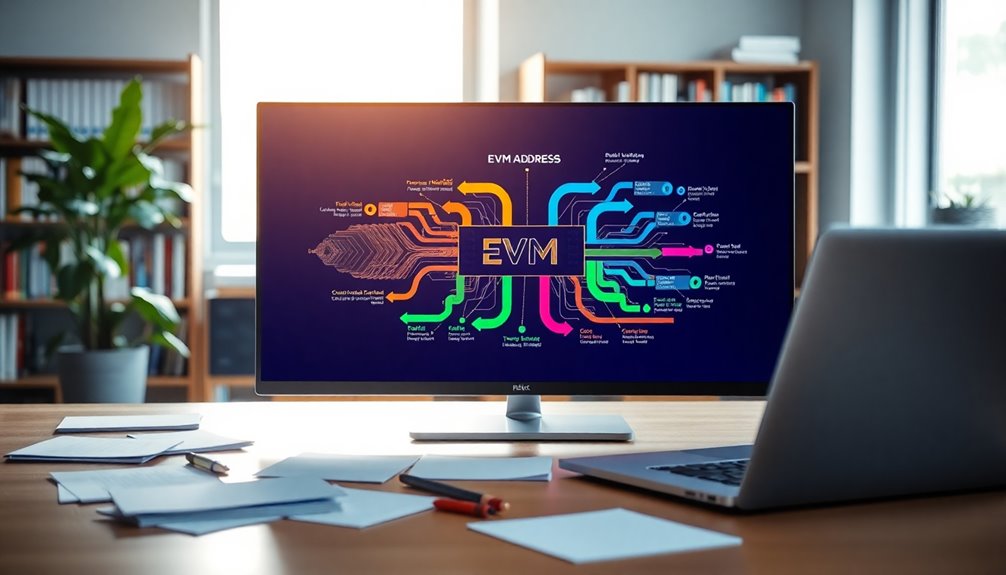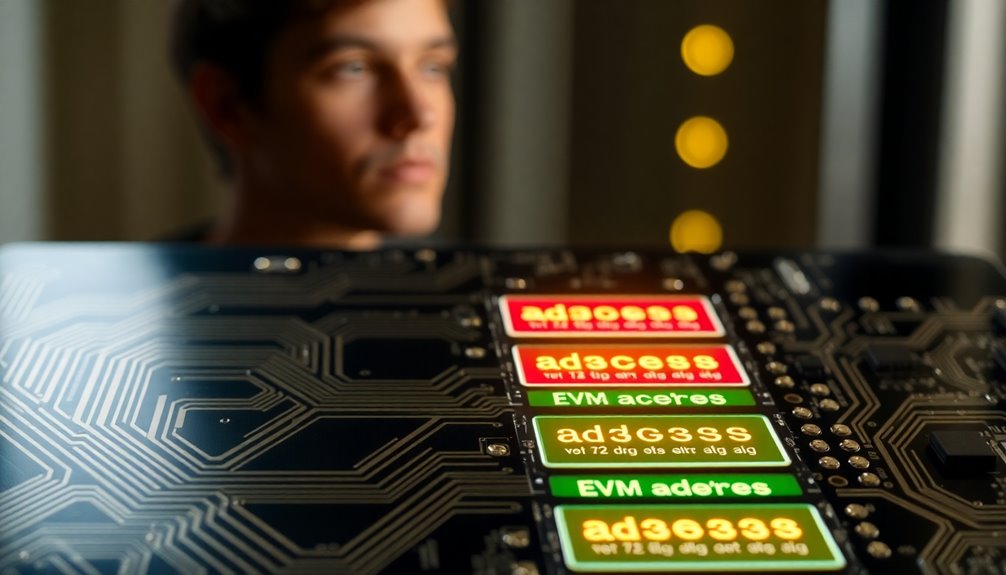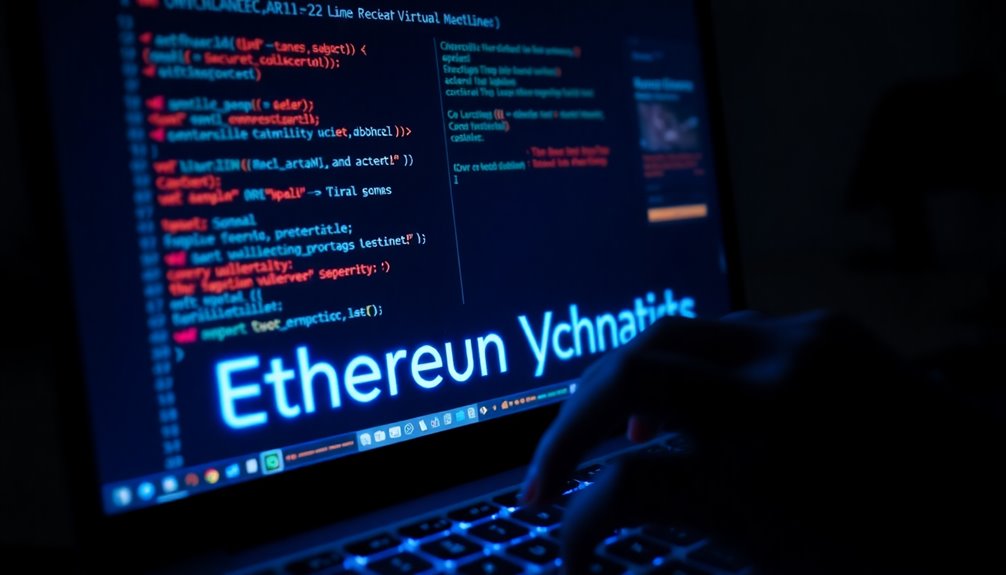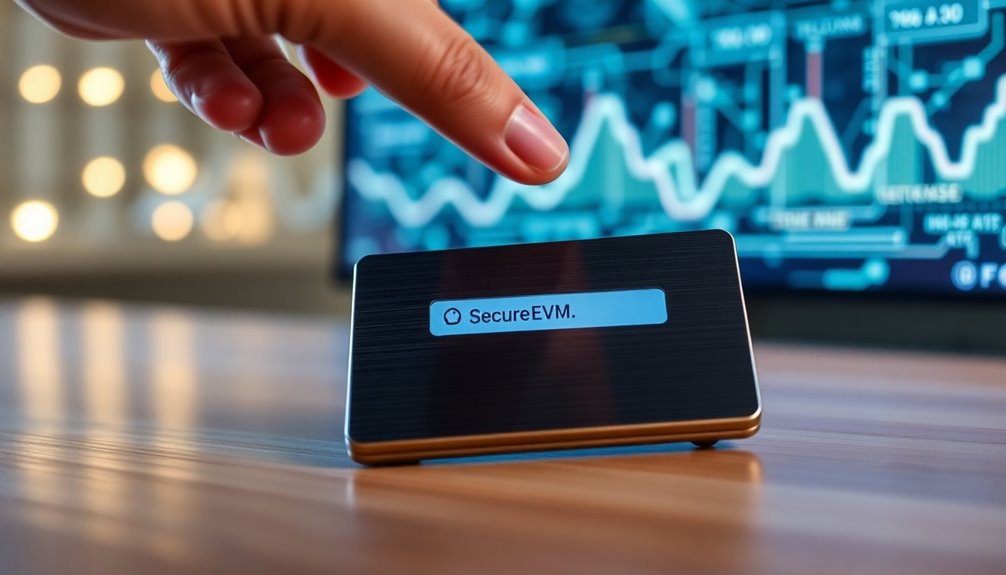An EVM address is your unique identifier in the Ethereum ecosystem, starting with '0x'. It's a 40-character alphanumeric string, making a total of 42 characters when you include the '0x'. You use EVM addresses to send, receive, and interact with smart contracts and decentralized applications (dApps). These addresses are case insensitive and essential for managing your digital assets. They provide a pseudonymous way to perform transactions while maintaining privacy. If you're curious about how they're created or the security measures you should take, there's more to explore on the topic.
Key Takeaways
- An EVM address is a unique identifier in the Ethereum ecosystem, beginning with '0x' and consisting of 40 alphanumeric characters.
- It can represent either an Externally Owned Account (EOA) or a Contract Account, facilitating transactions and smart contract interactions.
- EVM addresses are publicly visible yet pseudonymous, ensuring user privacy while managing digital assets securely.
- Address generation involves a public-private key pair, with the public key hashed to derive the Ethereum address using the Keccak-256 function.
- Security measures such as multifactor authentication and private key encryption are essential for protecting EVM addresses and associated assets.
EVM Address Fundamentals

EVM addresses serve as unique identifiers in the Ethereum ecosystem and its compatible networks. They begin with '0x' and are followed by 40 alphanumeric characters, making a total of 42 characters.
These addresses aren't case sensitive and maintain the same format across various EVM-compatible networks like Polygon, BSC, Fantom, and Avalanche. This consistency allows you to interact seamlessly with these networks using tools like MetaMask. Furthermore, each address is crucial for the execution of smart contract execution within the EVM.
Each address represents an account, either an Externally Owned Account (EOA) or a Contract Account, and plays a crucial role in transactions and smart contract calls. The addresses are stored on the blockchain, forming an essential part of the system state and enabling you to identify and interact with specific accounts efficiently.
Understanding EVM Address Significance

In the Ethereum ecosystem, wallet addresses play a vital role as unique identifiers for users and their digital assets. Each EVM address is an alphanumeric string starting with "0x" and allows you to differentiate between wallets. This uniqueness is crucial for sending, receiving, and storing digital assets securely. EVM addresses also enable interaction with smart contracts and decentralized applications (dApps), facilitating various transactions beyond simple exchanges. While your wallet address is publicly visible, it remains pseudonymous, providing a level of privacy. The relationship between your public and private keys ensures secure transactions, while the Ethereum Virtual Machine (EVM) ensures that all operations are executed in a sandboxed environment, protecting sensitive data from unauthorized access. Additionally, EVM addresses serve as crucial tools for managing Ethereum-based assets, enhancing user engagement with the broader blockchain ecosystem.
Address Generation Process Explained

When generating an EVM address, you start with a key pair consisting of a public and private key.
First, obtain an ECDSA public key, often using the 'ecdsa_public_key' API method from the management canister. This method requires the specification of a derivation path and key ID.
Next, convert the public key to the correct format, typically the SEC1 format. Ensure it's in decompressed representation before applying the Keccak-256 hash function to derive your Ethereum address.
The resulting address will begin with '0x' and contain 40 alphanumeric characters, totaling 42 characters.
Remember, EVM addresses are case insensitive and utilize the hexadecimal system.
You can use libraries like 'k256' and 'ethers_core' for this conversion in languages such as Rust.
Pros and Cons Overview

Understanding the process of generating an EVM address sets the stage for evaluating the advantages and disadvantages of using the Ethereum Virtual Machine.
On the pro side, the EVM is developer-friendly, enabling quick coding without disrupting the blockchain. It also supports scalable and interoperable solutions, enhancing transaction speed and facilitating cross-chain compatibility. The EVM ensures security and consensus, making it ideal for decentralized applications. Additionally, the EVM's capability of Turing completeness allows developers to create complex computations within their smart contracts.
However, there are notable cons. High gas fees can be a barrier, especially during congestion, while scalability limitations may hinder performance. The technical complexity of smart contracts can deter new developers, and reliance on centralized services introduces risks.
Weighing these factors can help you navigate the EVM landscape effectively.
Address Types Differences

While exploring the different address types used in the Ethereum ecosystem, you'll find that each serves a specific purpose and comes with its own set of rules.
Ethereum addresses, starting with '0x', consist of 42 characters and are compatible across EVM-compatible networks like Polygon and BSC. You can use the same address on different networks without issues.
In contrast, Filecoin has five address classes (f1 to f4 and f410) with unique conversion rules. The Ethereum Address Manager facilitates conversions between Ethereum and Filecoin addresses, ensuring that address integrity is maintained during the process.
For Ethereum-compatible FVM development, 'f410/t410' addresses are crucial. Understanding these differences helps you navigate the ecosystem effectively and utilize each address type to its full potential.
Security Vulnerabilities in Smart Contracts

Navigating the Ethereum ecosystem involves not just knowing the different address types, but also being aware of the security risks associated with smart contracts.
Common vulnerabilities include reentrancy attacks, where attackers exploit contract logic by repeatedly invoking functions. Integer overflow and underflow can miscalculate balances, while timestamp dependence may allow miners to manipulate outcomes. Regularly assessing common smart contract vulnerabilities is crucial for maintaining security.
You also need to watch out for access control flaws that grant unauthorized access.
Poor design can lead to unchecked external calls, hidden backdoors, and inefficient gas usage, opening the door to DoS attacks. Logic errors and insecure randomness can result in unintended behaviors and predictable exploits.
Regular audits, proper initialization, and strict access control are essential for mitigating these risks and safeguarding your assets.
Decentralized Identity Solutions Emergence

As the digital landscape evolves, decentralized identity solutions are emerging as a powerful answer to the growing concerns around privacy and data security.
You gain enhanced control over your digital identity, allowing you to share only the necessary information for each service. This reduces data exposure and minimizes the risks of data breaches associated with centralized storage. Decentralized identity addresses critical digital identity concerns and enhances user protection against unauthorized access.
With trusted issuers providing verifiable credentials and verifiers authenticating them, the process becomes streamlined. Technologies like decentralized identifiers (DIDs) and blockchain underpin these solutions, ensuring transparency and traceability.
Industries like finance and healthcare are already adopting these systems, promoting digital inclusion and regulatory compliance while eliminating single points of failure that often lead to cyberattacks.
Use Hardware Wallets for Security

To secure your digital assets effectively, using hardware wallets is a smart choice. These wallets store your private keys offline, minimizing exposure to internet threats and malware. This method, known as "cold storage," keeps your keys safe from hackers. Additionally, hardware wallets often utilize multifactor authentication, requiring a combination of PIN codes, fingerprint scans, or passphrases to access your keys. This extra layer of security makes unauthorized access much more difficult. Encryption further protects your private keys, rendering them unreadable without the correct decryption key. Secure elements within the wallet guard against both physical and digital threats. Moreover, they support a variety of cryptocurrencies and tokens, allowing for comprehensive asset management and enhancing security if you hold multiple digital assets. Plus, if your device is compromised or lost, recovery phrases let you regain access to your funds safely.
Frequently Asked Questions
Can I Change My EVM Address After Creation?
You can't change your EVM address once it's created; it's permanent.
If you want a different address, you'll need to generate a new one. Keep in mind that transferring assets to this new address will involve transaction fees.
Make sure to move all your necessary data and tokens before abandoning the old address.
Just remember, maintaining the security of your private keys is crucial to protect your assets.
How Do I Find My EVM Address?
To find your EVM address, just open your MetaMask wallet.
You'll see it displayed prominently at the top-middle of the homepage. If you switch networks, the same address will show for all EVM-compatible networks.
You can also check your account settings or transaction history for your address.
Are EVM Addresses Case-Sensitive?
Did you know that around 70% of cryptocurrency users have made mistakes when entering addresses?
Fortunately, EVM addresses aren't case-sensitive, meaning you can use uppercase and lowercase letters interchangeably without affecting the address's validity.
However, you should still double-check the address to avoid irreversible transactions.
Some addresses may use varied cases as a checksum for added security, but remember, it's the characters that count, not their case!
What Happens if I Lose My EVM Address?
If you lose your EVM address, you'll face significant challenges accessing your assets.
The private key tied to that address is crucial for managing your wallet, and without it, recovering your funds can be nearly impossible.
It's vital to keep your private key secure and backed up.
Some wallets do offer recovery features, so using one of those can help mitigate the risk of losing access in the future.
Can Multiple Accounts Share One EVM Address?
Oh sure, let's just throw caution to the wind and let multiple accounts share one EVM address, right?
Unfortunately, that's not how it works. Each EVM address is unique, like your quirky neighbor who insists on painting their house neon green.
If multiple accounts tried sharing, chaos would ensue! So, stick to one address per account to keep your transactions clear and secure.
After all, nobody wants a digital identity crisis!
Conclusion
In the ever-evolving ecosystem of Ethereum, understanding EVM addresses is essential for securing your digital assets. By embracing best practices and exploring decentralized identity solutions, you can protect yourself from potential pitfalls. So, safeguard your smart contracts, utilize hardware wallets, and stay savvy in this space. With a proactive approach, you'll navigate the nuances of EVM addresses with confidence, ensuring your crypto journey is both safe and successful. Stay secure, stay smart, and seize the opportunities ahead!









